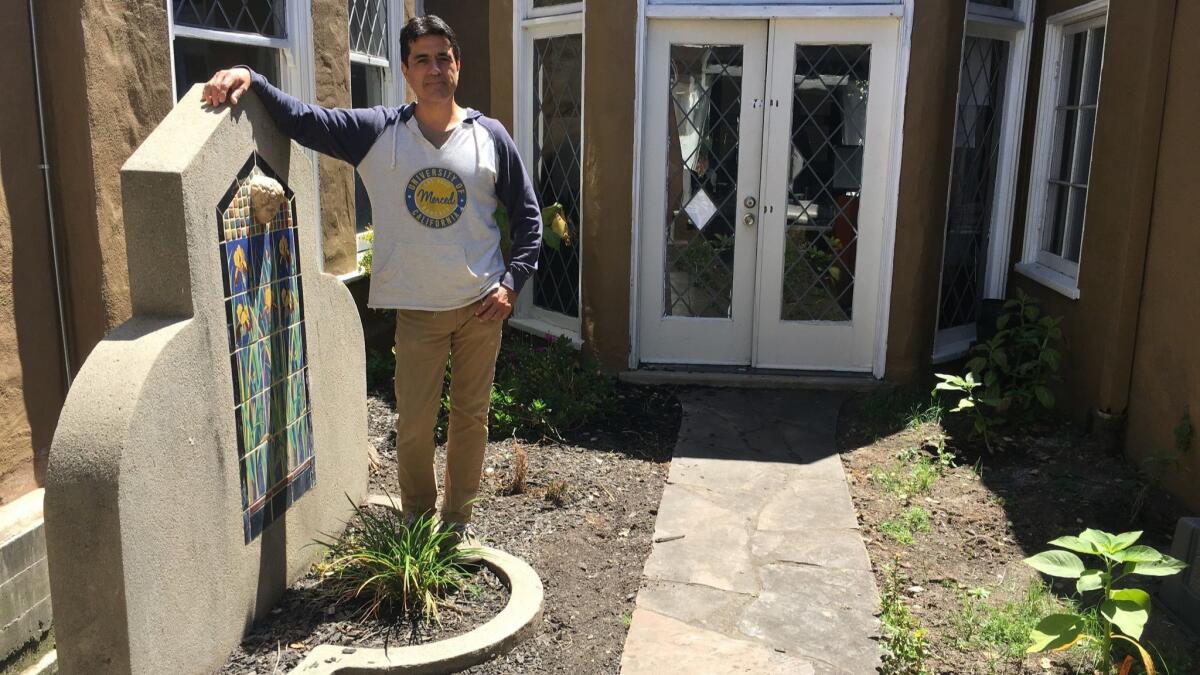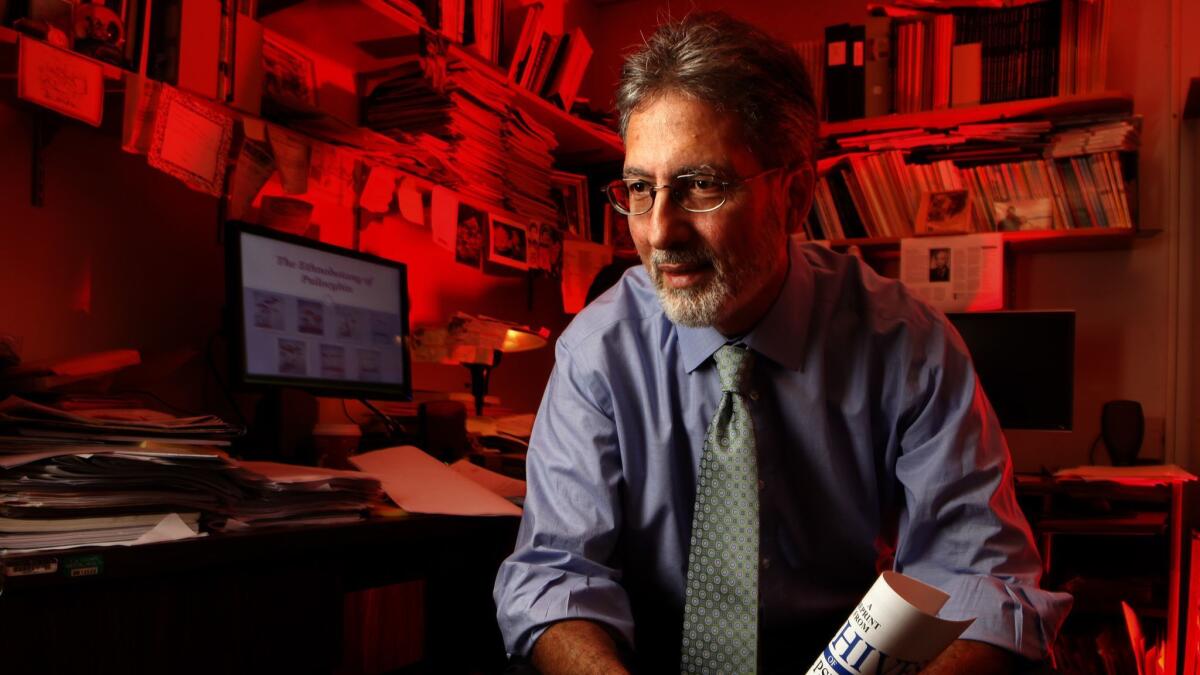How a trip on magic mushrooms helped decriminalize psychedelic plants in a California city

Reporting from Oakland — Carlos Plazola locked himself in a bedroom while his cousin stood guard.
For five hours, he tripped on magic mushrooms, nibbling the fungi and sipping them in tea. He ingested 5 grams — a heady amount that connoisseurs call the “heroic dose.”
It was Plazola’s first time using the mushrooms, which contain the naturally occurring hallucinogen psilocybin. He started having epiphanies, one right after the other, like lightning bolts.
“I was making connections that I had never made in terms of my understanding of what we are, what the cosmos are, why we’re here, where we’re going,” Plazola said.
That mushroom trip last October by Plazola, the well-connected onetime chief of staff of a former Oakland City Council president, helped make Oakland the first city in California and the second in the nation to effectively decriminalize magic mushrooms.
Plazola co-founded a group called Decriminalize Nature Oakland, which wrote the ordinance and successfully lobbied for its passage.
Psychedelic drugs, once widely derided as part of the hippie counterculture and the stuff of trippy “Alice in Wonderland”-style surrealism, are far from mainstream. But efforts to bring them out of the shadows and into the public realm are progressing at such a rapid clip that even supporters are surprised.
“Look at the decades of work that it took to get medical marijuana on the ballots,” said Brad Burge, a spokesman for the Multidisciplinary Assn. for Psychedelic Studies, a Santa Cruz-based nonprofit organization that researches psychedelic therapies. “Here, you have some of the first psychedelic decriminalization measures — and they’re passing.”
In May, Denver became the first city in the nation to decriminalize psilocybin mushrooms. Voters approved a ballot initiative by such a razor-thin margin that multiple news outlets initially reported that it had failed.
It was easier in Oakland. The City Council on June 4 approved its ordinance unanimously, with little pushback. Oakland even went a step further by decriminalizing not just mushrooms but also a range of other psychoactive plants and compounds including peyote, iboga and ayahuasca.
The measure, which applies only to plant-based hallucinogens and not synthetic drugs such as LSD and MDMA, does not actually legalize natural psychedelics, which remain illegal under state and federal law.
Instead, it declares the arrest and investigation of adults for using, possessing, growing or distributing plant-based hallucinogens to be among the lowest priorities for local police and restricts the use of city funds to go after users.
A California effort to decriminalize magic mushrooms failed to qualify for the statewide ballot in 2018, but a group called Decriminalize California has set up a campaign office in Hollywood and is trying again for 2020.
“If you get California, you get to talk to the U.S.,” said Ryan Munevar, the group’s campaign director. “And if the U.S. eventually flips, then the rest of the world falls after that. ... Basically any area that is relatively cool with weed is a good candidate.”
The Oakland resolution defines the psychedelics as “the full spectrum of plants, fungi, and natural materials deserving reverence and respect from the perspective of the individual and the collective, that can inspire personal and spiritual well-being, can benefit psychological and physical wellness, and can reestablish humans’ inalienable and direct relationship with nature.”
Plazola’s mission was helped by the fact that he was a longtime aide to former Oakland City Council President Ignacio De La Fuente and knew all the council members.
Councilman Noel Gallo, who introduced the measure, said he had “known him for a long, long time.”
“I had a lot of respect for what he’d accomplished. They came to my office with a surgeon, doctors, users, and I listened to him.”
Gallo says he is now routing queries from people interested in decriminalizing psychedelics to Decriminalize Nature Oakland, which says it has communicated with people in dozens of cities.

On a recent Friday, Plazola walked through a small garden at the de facto headquarters of Decriminalize Nature Oakland, an eclectic 1920s Swiss chalet and Tudor-style complex in a neighborhood dubbed Pill Hill because of all its medical facilities.
Plazola, a real estate developer, co-owns the property, which recently housed a marijuana dispensary. Construction is underway to turn it into housing and what Plazola calls a “consciousness community,” a co-working space where people can also meditate on their psychedelic journeys and learn about the plants.
The garden contained Salvia divinorum, a hallucinogenic mint, and brugmansia, or angel’s trumpet, which sprouts bell-shaped flowers with a psychoactive effect that, in high doses, can trigger convulsions, fever and delirium. In the front of the building, next to the sidewalk on busy Telegraph Avenue, grew San Pedro cacti, which contain the hallucinogen mescaline.
Unlike psilocybin mushrooms and peyote cactus, those plants are legal to buy and grow. To Plazola, they’re all just plants.
He said his mushroom trip last fall was the result of deep soul searching. He had just turned 50 and had a variety of careers: politics, community organizing, real estate development. He was “sort of bored.” He did yoga and meditated often but felt mentally blocked. Then he read author Michael Pollan’s bestseller “How to Change Your Mind: What the New Science of Psychedelics Teaches Us About Consciousness, Dying, Addiction, Depression, and Transcendence.”
“I was like, ‘OK, I need to try mushrooms,’ ” Plazola said.
Plazola said he’d been obsessed with mortality and the infinite since he was 7 and was told that a family member who had just died would live forever in heaven. He always saw himself as “this kind of odd person … who was living one foot in the grave.”
The mushrooms, he said, helped him make sense of all that. His realized he was “addicted to fear.” Afterward, he said, his wife told him he was more compassionate and that his children said, “Papa feels like a friend.”
Plazola started hosting meetings with a small group with expertise in the natural hallucinogens: a botanist, therapists and people who use natural hallucinogens for medicinal and spiritual reasons.
“I told them, ‘I used to work in politics; if you want to pass something, I’d be happy to help,’ ” Plazola said.
The group, which became Decriminalize Nature Oakland, called the plants “entheogenic” instead of hallucinogenic or psychedelic in the ordinance because those words, they say, have a stigma. So too, they said, does the phrase “magic mushrooms.”
“I was very, very angry and disappointed that our resolution passed unanimously in Oakland, but almost every headline was about ‘magic ‘shrooms’ and hallucinogens,” said Gary Kono, a retired dental surgeon and one of the group’s co-founders. “Those words trigger the audience into thinking of a recreational purpose when ‘entheogen’ means getting in touch with the spirit within you or having an experience with God.”
Kono said he was a hospice volunteer for five years. He wants to see natural psychedelics — which, studies show, can ease anxiety — be made available to patients contending with the prospect of imminent death.
Councilman Gallo, who was approached by the group earlier this year, said he was receptive because he was aware of the harm done in Oakland in years past, when authorities arrested blacks and Latinos on marijuana charges at a much higher rate than their share of the population.
Gallo also said his grandmother, who was Yaqui indian, was a curandera — a neighborhood healer — who treated family members with native plants growing in her backyard.
“Walgreens is not the only solution,” Gallo said. “When I go to the doctor, all they want to do is drug me.”
The new ordinance could potentially lead to entheogenic plant sales, Gallo said.
“The first step is decriminalizing it, and then the next step is, ‘All right, let’s move on: How do we do what we did with marijuana? How do we grow it? How do we sell it? How do we prescribe it?’”
An agenda report to the City Council’s Public Safety Committee, signed by Gallo, cites Decriminalize Nature Oakland’s opposition to sale of the plants. The report suggests that, to improve access, the city could have collectives to “provide a space to have an experience” or “road people” who could “visit those in hospice care or unable to leave their home.”
“It really is high-intentioned here,” Plazola said. “It’s not about money. Making it all about money is how we got into a place of opiate addiction and a horrible healthcare system.”

Scientists say they have fought decades of stigma to research psychedelics, which have shown potential in treating anxiety, depression, addiction and other ailments.
In October, the FDA granted “breakthrough therapy” status, meant to speed the development of drugs with strong potential, to a company testing psilocybin in people with treatment-resistant depression. Scientists with Johns Hopkins University recently recommended reclassifying it from a Schedule I drug with no known medical benefit to a Schedule IV drug akin to sleeping pills.
But researchers have urged caution, saying patients in clinical trials are monitored in safe, tightly controlled settings.
Charles Grob, a UCLA psychiatrist who has studied psychedelics for a quarter century, said he doesn’t want to see hasty decriminalization measures derail psychedelic research.
“People should not be taking these compounds and be wandering around the busy streets of the city” or driving, Grob said. “They should be in a quiet, contained space, ideally being monitored by someone who is not in an altered state of consciousness.”
Amber Senter, who does outreach for Decriminalize Nature Oakland, said education is a key component of the group’s work. Senter, who is black, co-founded the organization Supernova Women to advocate for women of color in the cannabis industry. She has lupus and uses psilocybin mushrooms to help with depression triggered by the pain.
Senter said black people, who are more susceptible to certain autoimmune diseases, could greatly benefit from them.
“We’ve always been told, ‘those are white people drugs,’ and something we don’t do,” Senter said. “It’s simply not true. I feel like we’ve never had access to it because it’s actually a very useful plant. We had access to worse things.”
Twitter: @haileybranson
More to Read
Sign up for Essential California
The most important California stories and recommendations in your inbox every morning.
You may occasionally receive promotional content from the Los Angeles Times.











